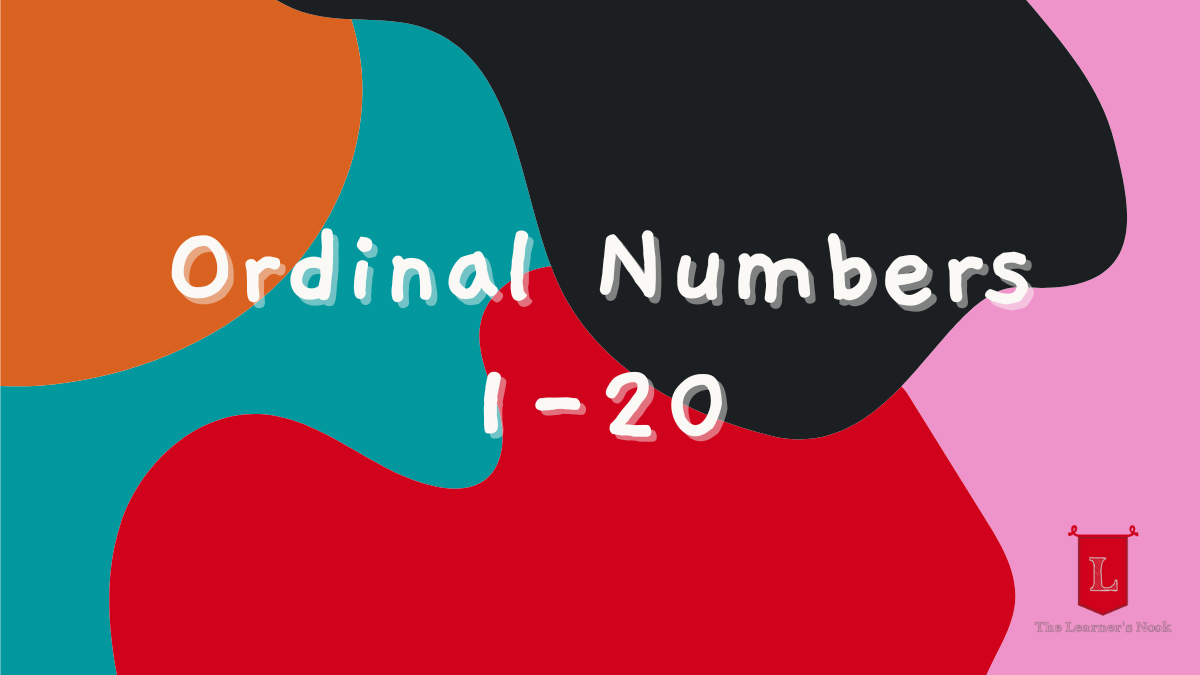Nothing beats the thrill of coming first in a competition. But, so many new learners of English have problems telling people about their accomplishments. This lesson should help you teach them about first, second, third, and all of the ordinal numbers from 1-20.
Before you teach ordinal numbers, your child should already be familiar with basic numbers. We have a lesson on basic numbers from 1-20 for you to use, so make sure to check that out first.
As well, in this post, we have some downloadables for you, including a poster and flashcards. You can find those after our list.
What is an ordinal number?
An ordinal number is used to show the position of something in a list. These lists can be of people, like in a race, or it could be of things, like ingredients in a recipe.
Each number has an ordinal version. For example, the ordinal number of 1 is first, 2 is second, and 3 is third. In our list that takes you from 1-20, all of the numbers (except 1-3) use the ending th. So, 4 becomes fourth, and twelve becomes twelfth.
Ordinal numbers from 1-20 are the hardest to learn, but past 20, ordinal numbers become easier as they begin to follow a set pattern. For example, 2 becomes second, 22 becomes twenty-second, and 33 becomes thirty-second.
Our List of Ordinal Numbers from 1-20
If you cannot see our list below, you can see a non-image version further down our page. As well, in our Downloadables Section, you can download this ordinal numbers poster, as well as ordinal number flashcards.

Downloadables for this Lesson
Our first downloadable is of the poster seen above. If you find it useful, you can download it for free by clicking on the link below.
Our second downloadable item is our flashcards. Each flashcard can be colored and used to practice this new vocabulary. We recommend that you use them for games and not for rote memorization drills. If you need suggestions, we have a list of vocabulary games that you can look at.
How do you write ordinal numbers?
Ordinal numbers can be written in one of two ways. One way includes the number, and the other is fully written out in words. It is important to note that both are said the same way.
The number version starts with the number and ends with a short form of the ending. So the written version of fifth becomes 5th. Or, the written version of first becomes 1st. You can see both versions in the chart above or below.
1
2
3
4
5
6
7
8
9
10
11
12
13
14
15
16
17
18
19
20
One
Two
Three
Four
Five
Six
Seven
Eight
Nine
Ten
Eleven
Twelve
Thirteen
Fourteen
Fifteen
Sixteen
Seventeen
Eighteen
Nineteen
Twenty
1st
2nd
3rd
4th
5th
6th
7th
8th
9th
10th
11th
12th
13th
14th
15th
16th
17th
18th
19th
20th
First
Second
Third
Fourth
Fifth
Sixth
Seventh
Eighth
Ninth
Tenth
Eleventh
Twelfth
Thirteenth
Fourteenth
Fifteenth
Sixteenth
Seventeenth
Eighteenth
Nineteenth
Twentieth
Final Thoughts on Ordinal Numbers
Ordinal numbers are an often overlooked part of English. This is unfortunate as we use them every day. We suggest that you start children learning this early. Especially first, second, and third as, throughout the day, they will undoubtedly use at least one of them.
If you are looking to practice ordinal numbers, any kind of game provides a great opportunity to review. Watch or compete in a race and announce the winners. Or, do some cooking and have everyone list out the steps in how you make your favorite treat.
Good luck with the teaching, and if you have any questions, feel free to comment below, and we will help however we can.
